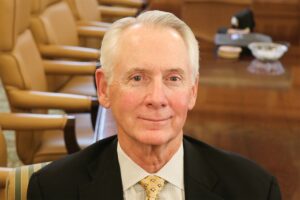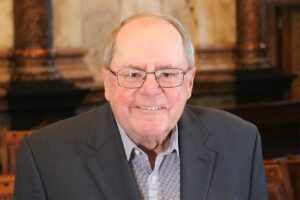Interview of Lee Johnson, May 22, 2023
Interviewed by Jim Concannon and Richard Ross
Retired Supreme Court Justice Lee Johnson is interviewed by his law school professor, Jim Concannon and colleague, Richard Ross about his career as an appellate judge on both the Court of Appeals and the Kansas Supreme Court. Justice Johnson's path to the Supreme Court was a little different than most who served. He was a small town lawyer, a mayor and businessman from rural Kansas. He was appointed first by a Republican governor to the Court of Appeals; then by a Democrat governor to the Supreme Court. The interview clearly describes how the Court of Show MoreAppeals functions, and how the appointment of several judges from that court to the Supreme Court influenced how the Supreme Court operated. He describes the role of dissents and their importance to the decision-making process. Upon his retirement, Johnson returned to Caldwell where he was born. Show Less






